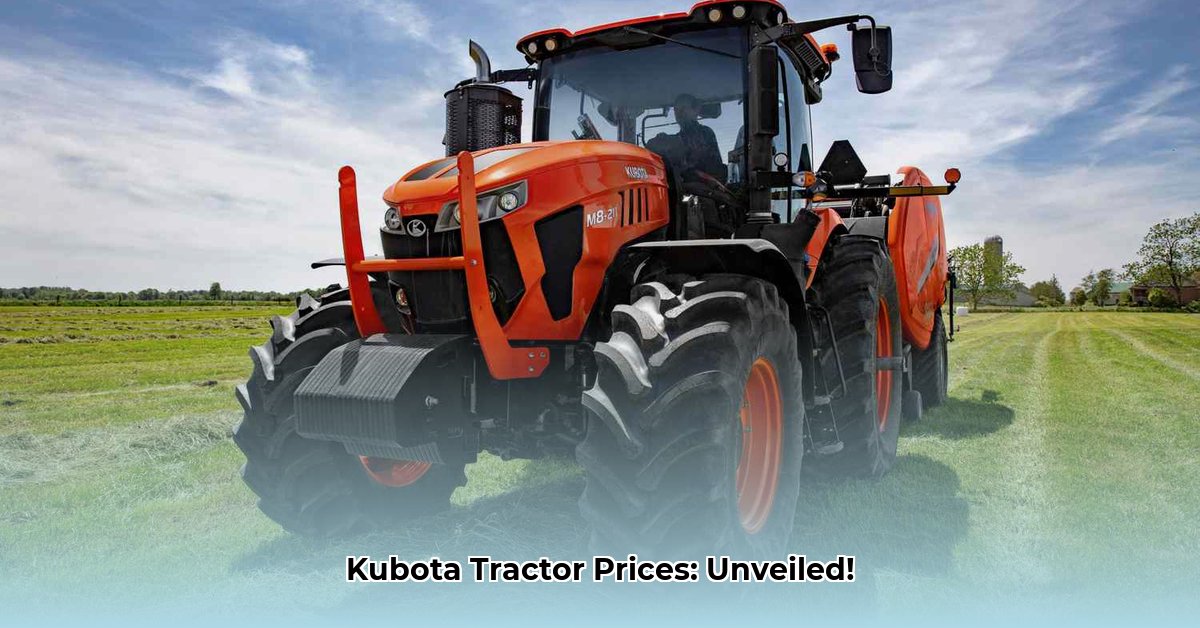
Thinking about purchasing a Kubota tractor? It's a significant investment, vital for efficient and sustainable farming operations, regardless of scale. This guide breaks down Kubota tractor costs, offering insights into price ranges, influencing factors, and actionable advice to help you make an informed decision. For example, check out this resource on 30 HP Kubota tractors.
Kubota Tractor Price Ranges: A Comprehensive Overview
The price of a Kubota tractor varies considerably, influenced by factors like horsepower, model type, features, and condition (new vs. used). A smaller, sub-compact model suitable for light landscaping or small yards can start around $8,000. However, larger, heavy-duty tractors designed for professional farming or extensive land management can easily surpass $150,000. Horsepower is a key determinant; higher horsepower equates to a higher price tag.
The table below provides a general price range for different Kubota tractor categories:
| Tractor Type | Horsepower Range | Approximate Price Range (USD) | Typical Use Cases |
|---|---|---|---|
| Sub-Compact | 18-26 | $8,000 - $18,000 | Small yards, hobby farms, light landscaping |
| Compact | 24-40 | $15,000 - $35,000 | Larger yards, small farms, hay baling, light tillage |
| Utility/Agriculture | 40-100 | $30,000 - $100,000 | Medium to large farms, heavy tillage, crop hauling |
| Industrial | 100+ | $100,000+ | Large-scale operations, construction, heavy lifting |
Note: These are estimates. The final price depends on specific model features, dealer markup, and location.
Factors Affecting Kubota Tractor Prices
Beyond basic specifications, several other factors influence the final cost:
Features and Attachments: Optional extras, such as air-conditioned cabs, GPS guidance systems, and specialized implements, significantly increase the cost. Prioritize essential features to control expenses. Is a heated cab truly necessary, or would a simpler model suffice?
Financing Options: Loan interest rates, down payment requirements, and lease terms dramatically impact the total cost. Shop around and compare offers from different lenders and Kubota dealers. Pre-approval can strengthen your negotiating position.
Used vs. New: Used tractors offer considerable cost savings (potentially 20-50% less than new models). However, they involve a higher risk of unexpected repairs and lack comprehensive warranties. A pre-purchase inspection by a qualified mechanic is strongly recommended. How much risk are you willing to accept in exchange for potential cost reduction?
Regional Variations: Local demand, taxes, and dealer competition influence pricing. Prices in one region may differ significantly from another.
Government Incentives: Explore potential government subsidies or tax incentives for agricultural equipment purchases. These can substantially reduce the overall cost.
New vs. Used Kubota Tractors: A Detailed Comparison
Choosing between a new and a used Kubota tractor involves weighing several key aspects:
New Kubota Tractor:
Pros: Full factory warranty, latest technology, potentially longer lifespan. Cons: Higher initial cost, faster depreciation.
Used Kubota Tractor:
Pros: Significantly lower purchase price, potential for cost savings. Cons: Higher risk of needing repairs, reduced warranty coverage, potential for hidden mechanical issues.
Financing Your Kubota Tractor: Available Options
Financing is often essential. Explore options like loans from banks or credit unions, financing packages from Kubota dealers, or leasing arrangements. Carefully compare interest rates, down payments, and loan terms. Consider the total cost of ownership, including interest, over the loan's or lease's life. "Don't just focus on the monthly payments; consider the total amount you'll repay," advises [Expert Name], [Title] at [Institution].
Maintaining Your Kubota: Ongoing Costs & Preventative Maintenance
Regular maintenance is crucial to maximize your tractor's lifespan and minimize costly repairs down the line. Budget for routine servicing (oil changes, filter replacements), potential parts replacements, and possible unexpected repairs. Preventative maintenance is key to long-term savings. "Proactive maintenance saves you money in the long run," states [Expert Name], [Title], [Institution].
Calculating Your Return on Investment (ROI)
Estimating the ROI of your Kubota tractor is vital to justify the investment. Assess potential savings from reduced labor costs, fuel efficiency, and increased crop yields. Compare projected savings to the total cost (purchase price, financing, maintenance, and fuel). While ROI calculations are estimates, they're essential for informed decision-making.
Conclusion: Making the Right Choice
The cost of a Kubota tractor is highly individual. Your specific needs, budget, and planned use will heavily influence your decision. Thorough research, careful planning, and a realistic assessment of your needs are crucial for determining the right fit for your operation. Remember to explore all available financing options and factor in ongoing maintenance costs to ensure long-term financial success.
Key Takeaways:
- Understanding Kubota tractor pricing is crucial for sustainable agriculture.
- Multiple factors influence the final cost, including horsepower, features, and condition.
- Financing options impact the total cost significantly. Shop around!
- Meticulous pre-purchase inspections are essential when buying used.
- Proactive maintenance planning is crucial for long-term profitability.
- Calculating ROI helps justify equipment purchases.